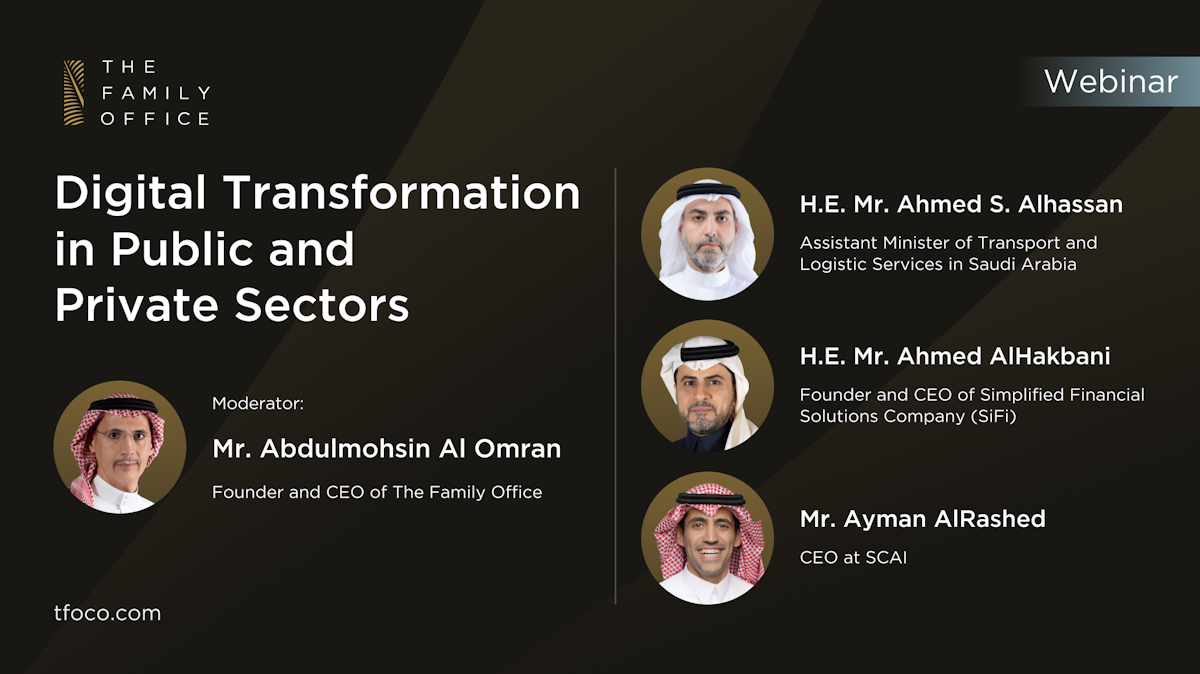Nov 7, 2023|General- 4 min
Below are the highlights of the discussion:
In response to a question about the difference between digitization and digital transformation, H.E. Mr. Ahmed AlHakbani explained that digitization is the conversion of information assets and processes into a technological version, which many institutions and organizations adopt at the beginning of their digital transformation journey. On the other hand, digital transformation in its comprehensive sense involves changing the nature of business execution within these establishments and reevaluating how work is done, customer service is provided, and suppliers are managed. Digital transformation helps create added value for the company, enabling them to enter new markets and offer new products. Digital transformation is therefore a broader concept than digitization.
In response to a question about the difference between digital transformation in the private sector and the public sector, H.E. Mr. Ahmed S. Alhassan revealed common key objectives of any digital transformation process, whether in the private or public sector. First, enhancing efficiency and productivity, and second, reducing costs and improving user experience. As the private sector is profit-oriented, the focus is on increasing efficiency, productivity, and cost reduction. On the other hand, in the public sector, being more comprehensive and service-oriented, the focus is on increasing efficiency and productivity to serve a larger number of beneficiaries.
Mr. Ayman AlRashed, CEO of Saudi Company for Artificial Intelligence (SCAI), provided an overview of artificial intelligence (AI) and the sectors in which it can be utilized, particularly in Saudi Arabia. AI is one of the technologies that aids in digital transformation. While digital transformation focuses on automating certain tasks and increasing productivity, AI simulates human intelligence. Machines gain the ability to see, hear, analyze, and provide recommendations. There is a distinction between AI and technology, as we have often seen older technologies change routine tasks and lead to automation. However, AI is a different concept that targets not only routine jobs but also those requiring creativity or deep thinking. The sectors that adopt AI more than others are those with the proper infrastructure and clear procedures, such as the banking and healthcare sectors.
During the discussion, H.E. Mr. Ahmed AlHakbani also addressed the challenges facing digital transformation in both the private and public sectors. These challenges arise from the lack of a clear digital transformation strategy, instead relying on purchasing or adopting technologies, resistance to change as some fear being replaced, a shortage of expertise, and considering the costs of digital transformation to be high. The difference between the two sectors lies in the ease of acquiring capabilities or expertise in the private sector compared to the availability of greater funding in the public sector.
H.E. Mr. Ahmed S. Alhassan revealed that digital transformation is a journey, not a short-term project. Considering the nature of the private sector, it focuses on profits and specific stages, which may not align well with the digital transformation journey. One of the most important lessons that can be learned from the public sector is the strategic outlook towards digital transformation, beyond profits and quarterly or annual results. However, the public sector can learn from the private sector's pursuit of achieving goals quickly.
Mr. Ayman AlRashed stated that Saudi Arabia is one of the most advanced countries when it comes to e-government, whether through Absher, Tawakkalna, or many other applications that have no equivalent in any other country. This applies to the government sector. As for the private sector, some large companies have previously lagged behind in collecting and storing their data, which has hindered their current ability to develop new systems or technologies to adopt artificial intelligence.
Watch the full webinar above to learn more about digital transformation and Artificial Intelligence, the importance of cybersecurity, and advice to the youth.

 Instagram
Instagram

